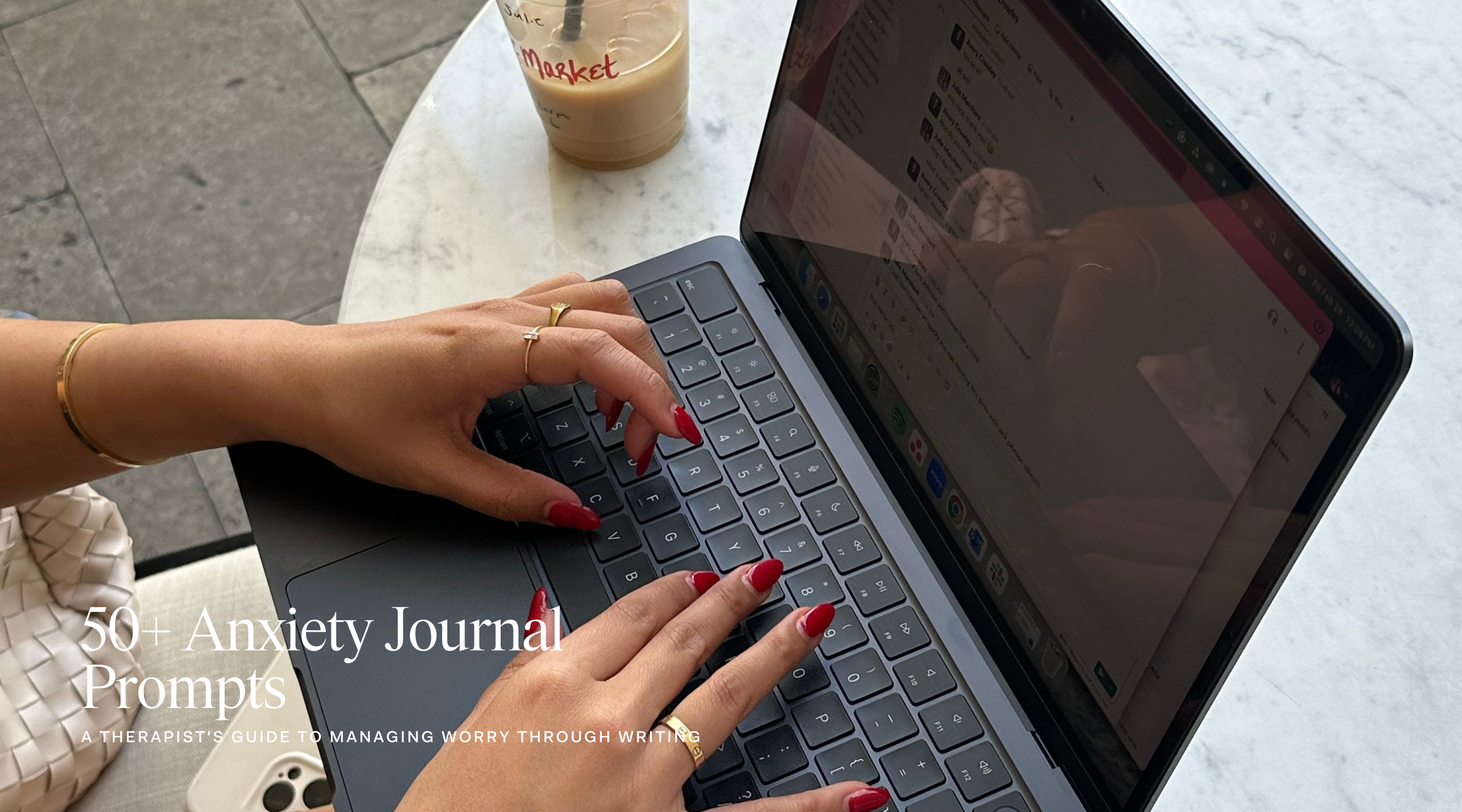50+ Anxiety Journal Prompts: A Therapist's Guide to Managing Worry Through Writing
If you've ever laid awake replaying conversations, catastrophizing about tomorrow, or feeling your chest tighten over things you can't control, you already know anxiety's favorite pastime: taking up permanent residence in your head without paying rent.
As a Licensed Clinical Mental Health Counselor who works with high-achieving women navigating anxiety daily, I've watched journaling become one of the most accessible and powerful tools in managing worry. Not the Instagram-aesthetic kind of journaling (though your journal can certainly be beautiful), but the messy, honest, brain-dumping kind that actually creates change.
The truth? Your anxious thoughts aren't your enemy. They're information. And journaling is how you learn to decode them.
Sign up with the form below!
Why Anxiety Journaling Actually Works
Anxiety thrives in ambiguity. It loves the vague, the "what if," the spiraling thoughts that never quite land anywhere concrete. Journaling forces specificity. When you write "I'm anxious about work," your brain has to pause and clarify: Which part of work? The presentation? My boss's tone in that email? The project deadline?
This process engages your prefrontal cortex (the rational, problem-solving part of your brain) and calms your amygdala (the emotional alarm system). Essentially, journaling helps you shift from reactive panic mode to responsive reflection mode.
Cognitive behavioral therapy can help challenge externalizing anxious thoughts through writing:
Reduces the intensity and frequency of worry
Helps identify cognitive distortions (those unhelpful thought patterns)
Creates distance between you and your anxiety
Builds awareness of triggers and patterns
Provides concrete evidence to challenge catastrophic thinking
Translation: Writing about your anxiety actually rewires how your brain processes worry.
How to Start Your Anxiety Journal (Even If You Hate Journaling)
Before we dive into prompts, let's address the elephant in the room: maybe you've tried journaling before and it felt forced, performative, or pointless. Anxiety journaling isn't about perfect prose or even complete sentences. It's about getting thoughts out of your head and onto paper where they can't endlessly loop.
Your Anxiety Journal Starter Kit:
Choose Your Medium: Digital or paper- whatever you'll actually use. Notes app at 2 AM? Valid. Beautiful leather journal? Also valid. Voice memos you transcribe later? Completely acceptable.
Ditch Perfection: Your journal is a judgment-free zone. Spelling errors, run-on sentences, and messy handwriting are all welcome here.
Set Realistic Expectations: You don't need to journal daily (though consistency helps). Even 5-10 minutes, a few times a week, can create meaningful change.
Create a Ritual: Consistency is key, so stick to the same time and place to help build the habit. Morning coffee journaling, lunch break brain dumps, or pre-bed thought downloads. Find what fits your rhythm.
The CBT Foundation: Understanding Your Anxiety Through Writing
Cognitive Behavioral Therapy forms the backbone of effective anxiety journaling. The core concept: your thoughts, feelings, and behaviors are interconnected. Change one, and you influence the others.
The Thought-Feeling-Action Connection
Situation: Your boss sends a vague "Can we talk?" email
Thought: "I'm getting fired. I must have messed something up."
Feeling: Panic, dread, stomach dropping
Behavior: Obsessively re-reading old emails, avoiding work tasks, catastrophizing
Through journaling, you learn to identify this chain reaction and interrupt it with evidence, alternative perspectives, and intentional responses.
50+ Anxiety Journal Prompts by Category
Daily Awareness Prompts (Understanding Your Baseline)
What does anxiety feel like in my body right now? Where do I notice it?
On a scale of 1-10, how intense is my anxiety? What would move it down one point?
What triggered my anxiety today? (Be specific—time, place, people, situation)
What thoughts preceded this anxious feeling?
If my anxiety could talk, what would it say it's trying to protect me from?
What did I worry about yesterday that didn't actually happen?
When did I feel calm today, even briefly? What was different in that moment?
Cognitive Distortions Prompts (Catching Unhelpful Thinking Patterns)
Am I catastrophizing? What's the worst-case scenario I'm imagining? What's the most likely scenario?
Am I mind-reading? What evidence do I actually have for what others are thinking?
Am I using all-or-nothing thinking? What does the middle ground look like?
Am I fortune-telling the future? What can I know for certain versus what I'm assuming?
Am I filtering out the positive? What went right today that I'm dismissing?
What "should" statements am I telling myself? (Example: "I should be further along by now")
Am I personalizing something that isn't about me?
Evidence-Based Challenge Prompts (The CBT Core)
What evidence supports my anxious thought? What evidence contradicts it?
Would I say this thought to my best friend in the same situation? What would I tell them instead?
What would someone who cares about me say about this situation?
Have I been in a similar situation before? What actually happened?
In five years, will this matter? In five months? In five days?
What's a more balanced way to think about this situation?
What can I control in this situation versus what's outside my control?
Emotion Regulation Prompts (Working With Feelings, Not Against Them)
What emotion is underneath my anxiety? (Often: fear, sadness, anger, shame)
What does this emotion need from me right now?
How do I typically cope with this feeling? Is it working?
What would self-compassion sound like in this moment?
If I accepted this anxious feeling without trying to fix it, what would change?
What helps me feel grounded when anxiety spikes?
Who or what makes me feel safe?
Pattern Recognition Prompts (Identifying Your Anxiety Profile)
What situations consistently trigger my anxiety?
What time of day is my anxiety typically highest? Lowest?
How does lack of sleep affect my anxiety?
What relationships intensify my worry?
Do certain foods, drinks, or substances increase my anxiety?
When do I feel most in control? What's present in those moments?
What coping mechanisms actually help versus just provide temporary relief?
Worry Window Prompts (Containing Rumination)
What am I worrying about that I have zero control over?
What action could I take about this worry? When will I take it?
Is this worry productive (leading to solutions) or unproductive (just spinning)?
Have I already worried about this today? What new information do I have now?
What would happen if I gave myself permission not to think about this for the next hour?
Values & Meaning Prompts (Connecting to What Matters)
What matters most to me? How is anxiety preventing me from living that value?
What would I do today if anxiety weren't driving my decisions?
What does my ideal day look like? What small piece of that can I do today?
What am I avoiding because of anxiety? What's the cost of that avoidance?
Who do I want to be in this situation? How can I act in alignment with that?
Gratitude & Perspective Prompts (Balancing the Negativity Bias)
What went better than expected today?
What challenge did I handle well this week?
What am I grateful for that I usually take for granted?
What strength helped me cope with anxiety today?
What's one thing about my life that my anxious thoughts make me forget?
Future-Self Prompts (Building Resilience)
What will "Future Me" thank "Present Me" for doing today?
What advice would I give my younger self dealing with this anxiety?
How have I grown in managing anxiety over the past year?
What do I want to remember about how I handled today's anxiety?
Advanced Journaling Techniques for Anxiety
The Thought Record (Classic CBT Tool)
This structured approach helps you systematically challenge anxious thoughts:
Situation: Describe what happened objectively.
Automatic Thought: What thought popped up?
Emotion: What did you feel? (Rate intensity 0-100)
Evidence For: What supports this thought?
Evidence Against: What contradicts it?
Alternative Thought: What's a more balanced perspective?
Outcome: How do you feel now? (Rate 0-100)
The Worry Script Technique
For persistent worries, write out your worst-case scenario in excruciating detail. Keep writing until your anxiety peaks and then naturally decreases. This exposure-based technique (used in CBT) helps your brain realize that just thinking about something doesn't make it happen.
The "What I Can Control" List
Anxiety loves focusing on the uncontrollable. Combat this by creating two columns:
Things I Cannot Control
Things I Can Control
Then, focus your energy exclusively on the second column. This simple redirect can significantly reduce spinning thoughts.
When Journaling Isn't Enough (And That's Okay)
Here's what I tell my clients: Journaling is a powerful tool, but it's not a substitute for professional help when needed. Consider reaching out to a therapist if:
Your anxiety interferes with daily functioning (work, relationships, self-care)
You're experiencing panic attacks
Avoidant behaviors are limiting your life
Sleep is consistently disrupted
You're using unhealthy coping mechanisms
The anxiety feels unmanageable despite your best efforts
Therapy provides the personalized guidance, evidence-based techniques, and supportive relationship that journaling alone can't replicate.
Your Anxiety Journal Journey Starts Now
The beautiful thing about anxiety journaling? There's no wrong way to do it. Some days you'll write pages, other days a single sentence. Some entries will reveal profound insights, others will just get the static out of your head. All of it counts.
Start with one prompt. Write for five minutes. Notice what shifts. That's the work.
About the Author
Brianna is a Licensed Clinical Mental Health Counselor (LCMHC) and founder of On Par Therapy, a boutique virtual practice serving high-achieving women across five states. She specializes in anxiety, perfectionism, and burnout using evidence-based approaches including CBT, DBT, and Motivational Interviewing. Her work has been featured in Vogue, Forbes, Time, and Bustle.
Brianna works with clients located in New York, New Jersey, Massachusetts, Florida, and South Carolina
Schedule an introduction call with Brianna here.




